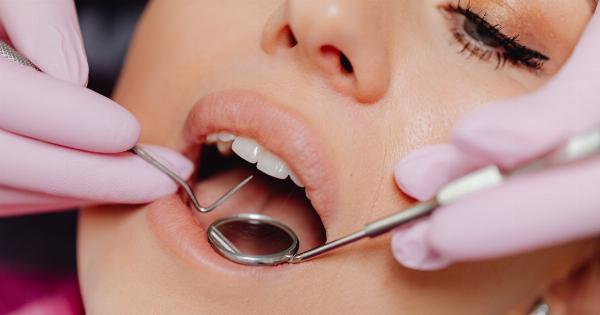We all know that brushing our teeth is an essential part of maintaining good oral hygiene. However, there may be times when we forget to brush or intentionally skip it for various reasons.
But have you ever wondered what happens when you fail to brush your teeth? In this article, we will explore the consequences of neglecting your oral care routine and the potential risks it poses to your overall dental health.
1. Plaque Accumulation
The buildup of plaque is one of the immediate consequences of not brushing your teeth regularly. Plaque is a sticky film of bacteria and food particles that forms on the surfaces of your teeth.
If left undisturbed, plaque can harden and turn into tartar, which is much more difficult to remove. The accumulation of plaque and tartar can lead to numerous dental problems.
2. Tooth Decay (Cavities)
Failure to brush your teeth allows the bacteria in plaque to produce acids that can damage the tooth enamel, leading to tooth decay or cavities.
When cavities are left untreated, they can progress deeper into the tooth, causing pain, infection, and even tooth loss.
3. Gum Disease
Skipping brushing sessions can also contribute to the development of gum disease. Gum disease begins with gingivitis, characterized by inflamed and bleeding gums.
If not addressed, it can progress to periodontitis, a more advanced stage that affects the tissues supporting the teeth. Gum disease can lead to tooth loss and has been linked to other systemic health issues.
4. Bad Breath (Halitosis)
Regular brushing helps remove food particles and bacteria that cause bad breath. When you fail to brush your teeth, these particles can accumulate and release foul-smelling odors.
Chronic bad breath can be embarrassing and may even indicate underlying dental problems.
5. Discoloration and Stains
Without proper brushing, your teeth can become stained and discolored over time. Foods and beverages like coffee, tea, and red wine can leave behind pigments that adhere to the tooth enamel.
Plaque buildup also contributes to discoloration, making your teeth appear yellow or brownish. Stained teeth can affect your smile and confidence.
6. Sensitivity
When you neglect to brush your teeth, plaque and tartar can cause gum recession, exposing the tooth roots. This exposure can lead to increased tooth sensitivity, making it uncomfortable to consume hot or cold foods and drinks.
Sensitivity can significantly impact your eating and drinking habits.
7. Increased Risk of Tooth Fractures
The lack of oral hygiene can weaken your tooth enamel, making it more prone to fractures. Without regular brushing, bacteria and acids eat away at the protective enamel layer, making your teeth vulnerable to damage from chewing or grinding.
Fractured teeth may require extensive dental treatments to restore their form and function.
8. Systemic Health Complications
Oral health is closely linked to overall health, and neglecting your dental hygiene can have implications beyond your mouth.
Studies have shown associations between gum disease and various systemic conditions like heart disease, stroke, diabetes, and respiratory infections. Poor oral hygiene can contribute to the development or worsening of these conditions.
9. Expensive Dental Treatments
If you continuously fail to brush your teeth, the potential oral health problems that arise can lead to expensive dental treatments.
From fillings and root canals to gum surgeries and tooth replacements, the costs of restoring your dental health can be significantly higher than maintaining it with proper brushing and care.
10. Increased Dental Anxiety
Neglecting your oral hygiene can result in the need for various dental procedures, which can lead to a cycle of dental anxiety.
Regular brushing and dental check-ups help prevent dental issues and minimize the need for invasive treatments, reducing anxiety and promoting better oral health overall.
It is clear that neglecting to brush your teeth can have serious consequences for your dental health and overall well-being.
Remember to adhere to a proper oral care routine, including brushing your teeth at least twice a day, flossing regularly, and scheduling regular dental check-ups. By maintaining good oral hygiene practices, you can enjoy a healthy smile and prevent the potential risks associated with failing to brush your teeth.




























